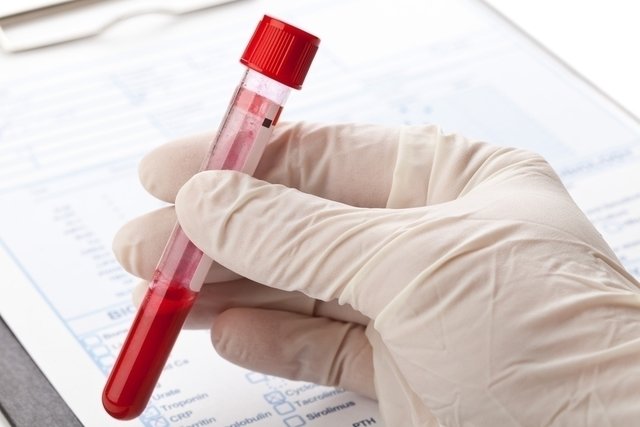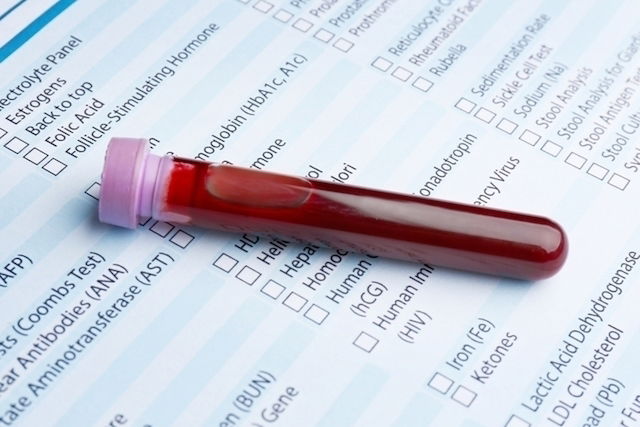The TSH blood test is used to evaluate thyroid function and is normally ordered by the family doctor or endocrinologist. It checks to see if the thyroid gland is working properly or if it is showing signs of hyperthyroidism, hypothyroidism or cancer, like follicular or papillary thyroid cancer.
The thyroid-stimulating hormone (TSH) is produced by the pituitary gland. Its job is to stimulate the thyroid and produce the T3 and T4 hormones. When TSH levels are high in the blood, it means that T3 and T4 concentration in the blood are low. In contrast, when TSH is high in the blood, T3 and T4 levels will be low.
Read more about symptoms of thyroid problems that may prompt your doctor to order a TSH test.

Normal levels
Normal TSH levels will depend on the person's age, and the lab where the test was completed. Typically, the ranges are:
During pregnancy, the normal levels will change:
What the results can mean
High TSH
- Hypothyroidism: Most times, when TSH is high, it means the thyroid is not producing sufficient hormones, and therefore the pituitary gland has to compensate by increasing TSH levels in the blood, so that the thyroid will work normally. One of the characteristics of hypothyroidism is a high TSH level and low T4 level. Subclinical hypothyroidism is characterized by a TSH level that is high, but a T4 that is still normal.
- Medications: Low doses of medications for hypothyroidism or other medications, like propranolol, furosemide, lythium and medications with iodine can increase TSH levels in the blood
- Pituitary tumors can also cause high TSH levels
The symptoms associated with a high TSH are typical of hypothyroidism, like fatigue, weight gain, constipation, feeling cold, increased facial hair, difficulty concentrating, dry skin, and fragile hair or finger nails.
Low TSH
- Hyperthyroidism: A low TSH normally indicates that the thyroid is producing excessive amounts of T3 and T4, causing high levels in the blood. Therefore the pituitary gland produces less TSH to try to regulate thyroid function.
- Use of medication: When the dose of medication for hyperthyroidism is too high, the TSH levels can actually become too low. Other medications that can cause TSH levels are aspirin, corticoids, dopaminergic agonists, diclofenac, heparin, metformin, nifedipine or piroxidine.
- Pituitary tumors can also cause low TSH levels.
Symptoms related to low TSH levels are similar to those of hyperthyroidism, like agitation, palpitations, insomnia, weight loss, nervousness, tremors and decreased muscle mass. With hyperthyroidism, it is expected to have low TSH levels and high T4 levels. However, if T4 is still within 01 e 04 μUI/mL, this can indicate subclinical hyperthyroidism. Low TSH and low T4 can indicate anorexia nervosa, however any diagnosis must be confirmed by the doctor who ordered the bloodwork.

How TSH testing is done
TSH testing is done by collecting a small sample of blood. It should be done while fasting for at least 4 hours. It is collected and sent to the lab for analysis.
The best time to do this test is in the morning, as TSH concentrations will vary throughout the day. Before completing the exam, it is important to report whether you are using medication, especially thyroid medication like levothyroxine, as medication can alter the final results.
What is a sensitive TSH
A sensitive TSH, or TSH-s, is a more advanced testing that detects the minimal amounts of TSH in the blood that a normal exam is unable to identify. This method used in the labs is very sensitive and specific, and is the most commonly used way of measuring TSH.
When is TSH testing ordered
The TSH blood test can be ordered for healthy people, just to check thyroid functioning. It is also ordered to monitor illnesses like hyperthyroidism, hypothyroidism, Hashimoto's thyroiditis, a thyroid volume increase, a thyroid nodule that is benign or malignant, during pregnancy and even to monitor the dosing of thyroid hormone replacement medication, in cases where the thyroid was surgically removed.
Normally, this exam is ordered for all people over the age of 40, even if there is no positive family history for thyroid disease in the family. Check-out other thyroid tests that your doctor may order.
